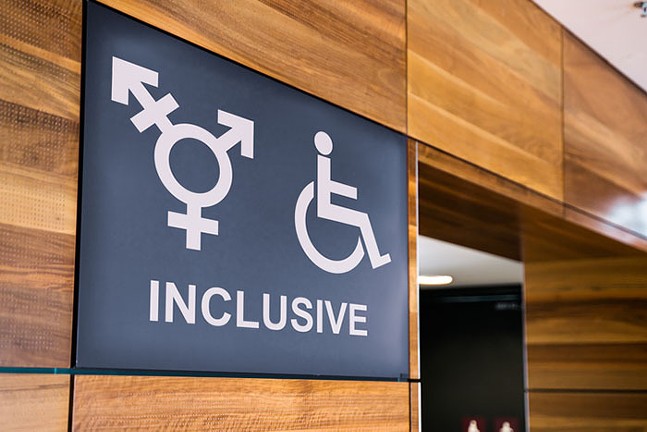Trans and nonbinary people’s fight for safe access to bathrooms in Allegheny County could see a victory on behalf of LGBTQ+ folks and allies during an Allegheny County Board of Health meeting, but a major hurdle might stand in the way: unlicensed plumbers.
The Board of the Health will discuss a proposed amendment to Article XV of the Allegheny Health Department Rules and Regulations during its virtual Wed., Sept. 1 meeting at 12:30 p.m. The amendment includes language that will expand access to single-use bathrooms for people of any sex, but the same amendment also strikes language requiring site work installation to be performed only by licensed plumbers, and it is causing some uncertainty over the prospects of passing the amendment.
"These two issues have nothing to do with each other, and it seems to me that pairing all-gender restroom access with deprofessionalizing the plumbing trade creates an artificial antagonism between trans people and skilled trade workers," says Luca Salerno, who is transmasculine and opposes the site work provision of the amendment.
Previously, if a business wanted to build a gender-neutral bathroom, it had to seek a code variance from Allegheny County. The issue is often thought of as one that falls under the umbrella of LGBTQ+ rights, but implementing change requires amending the plumbing code, which includes sections that regulate restroom fixtures.
While it is unclear why the Board of Health has tied these two changes together, public comments submitted for discussion during the meeting are split consistently based on the two issues. Those in support of the amendment typically commented on the expansion of single-use bathrooms, while those who oppose the amendment overwhelmingly commented on the allowance of unlicensed plumbers to perform site work. Many of the latter stated that they themselves were licensed plumbers.
If passed, the amendment would require nightclubs, bars, taverns, dance halls, restaurants, and buildings for similar purposes to include a single-use bathroom when an aggregate of eight or more male and female water closets (toilets) are provided. The amendment adds that these single-use bathrooms can be identified for use by people of any sex.
For buildings in which the minimum number of required plumbing fixtures exceeds the minimum number required under the International Plumbing Code, the amendment allows the additional fixtures to be located in single-use bathrooms and “identified as being available for use by all persons regardless of their sex.”
The amendment also specifies that family or assisted-use toilets will not be required to be labeled for exclusive use by any sex. It also adds an exception to the rule that separate male and female facilities must be provided when plumbing fixtures are required. Previously, the plumbing code only made exceptions for dwelling and sleeping units, structures or tenant spaces with an occupancy of 15 or fewer people, and mercantile buildings with occupancy levels of 50 or fewer people.
The plumbing code requires a specific number of toilet and sink fixtures for different types of buildings. These numbers also depend on the number of people a building can accommodate and are broken down by fixtures for men and for women. Should the amendment pass, two family or assisted-use toilet facilities will also be able to fulfill the toilet and sink fixture requirements for buildings that only require one toilet for each sex.
The amendment would also prohibit requiring those toilet facilities be labeled for exclusive use by any sex, although urinals will still be required in nightclubs, bars, taverns, dance halls, restaurants, and buildings for similar purposes.
"Regardless of whether the amendment is approved or not, there is more work to be done: there is no reason why all single-occupancy restrooms should not be open to people of all genders," Salerno says. "There is no reason why a business should not be free to choose to install an all-gender multi-stall restroom if all the stalls have floor-to-ceiling dividers."
While the amendment would be a step forward for trans and nonbinary people in Allegheny County, as well as making bathrooms more accessible to disabled people, elderly people, and people with young children, licensed plumbers are concerned about the standard of work the amendment would allow if people without plumbing licenses are allowed to plumb.
Many commenters mention the five years of training that are required to become a licensed plumber, as well as bringing up concerns for public health if people without licenses are allowed to perform site work. One comment signed by nearly 20 people asks, “Would you hire someone who is not an electrician to install your electric to your house? Why would you let someone who doesn't know how to plumb do plumbing?”
Those who wish to attend the Board of Health meeting can do so through the health department’s Facebook page. People can also submit comments via a form on the health department’s website.


